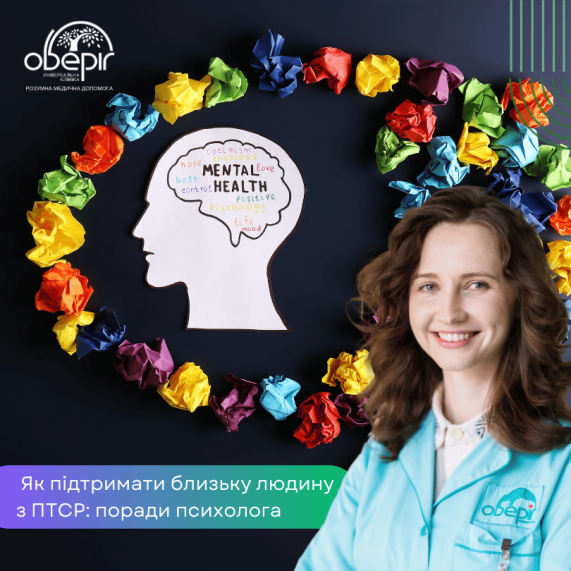How to support a loved one with PTSD
24 September 2024


24 September 2024


Post-traumatic stress disorder (PTSD) - it is a complex condition that can develop after experiencing a traumatic event. This traumatic experience can be associated with the sudden death of a loved one, an episode of violent acts (rape, torture, mutilation, etc.) both in relation to oneself and in the case of witnesses of violent acts; as a result of being in a natural disaster zone, hostilities, areas of mass death of people or animals, being in conditions where physiological needs cannot be met, etc. PTSD, as a rule, develops during the first month after the realization of a stressful event and is characterized by a certain range of clinical symptoms. These symptoms can vary from person to person and over time, but in general they can be divided into several categories:
Re-experiencing trauma:
Flashbacks (vivid, recurring memories of an event)
Nightmares
Intense emotional reactions to trauma reminders
Avoidance:
Active avoidance of places, people, or situations associated with the trauma
Avoiding thinking or talking about the trauma
Changes in mood and thinking:
Feeling detached or alienated from others
Difficulty with concentration
A constant feeling of anxiety or alertness
Sleep problems
Intense feelings of guilt, shame, fear
Agitation and irritability
Irritation
Anger
Aggressive or self-destructive behavior.
Important: This list is not exhaustive, and PTSD symptoms can manifest differently for each person. If you suspect that you or someone you love has PTSD, seek help from a qualified professional. Specialized, comprehensive help of a psychiatrist will help you restore your psychological state and quality of life.
Advice from a psychiatrist: How to support a loved one with PTSD
Understanding and support are vital for people living with post-traumatic stress disorder (PTSD). Here are some tips that can help you support a loved one who is experiencing this condition:
1. Accept their feelings: Don't discount their fears, flashbacks, or nightmares. A better model of behavior is empathy and participatory listening if the person with PTSD is willing to share their experiences with you. Do not try to reassure the patient that you understand them if you have not had a similar traumatic experience.
2. Be patient: Recovery from PTSD can take a long time. Don't expect them to quickly return to their old lives. Treat mood swings and behavior as symptoms of an illness that must be overcome together.
3. Don't force them to talk: If they're not ready to share their feelings, don't pressure them. Let them know you're always ready to listen when they're ready.
4. Provide practical help: Help with everyday tasks: If your loved one is struggling with everyday tasks, offer to help.
5. Create a safe space: Make your home or other place where you spend time together safe and calm.
6. Encourage a healthy lifestyle: Regular exercise, a balanced diet, and adequate sleep can help reduce PTSD symptoms.
7. Help them find professional help: Encourage your loved one to see a therapist or other mental health professional.
8. Take care of yourself. Take care of your emotional state: Caring for a loved one with PTSD can be exhausting. Do not forget about yourself and find time to rest and take care of your health.
9. Talk about your feelings: Talk to friends, family, or a therapist about how you're feeling.
10. Join a support group: Talking to other people who have similar experiences can be very helpful.
Remember: You are not alone. There are many resources and organizations that can provide support for you and your loved one.
Important: This information is general in nature and is not a substitute for consultation with a qualified professional.
Together you can overcome this difficult period.
Need help? Sign up for a consultation with a specialist at +38 044 521 30 03
